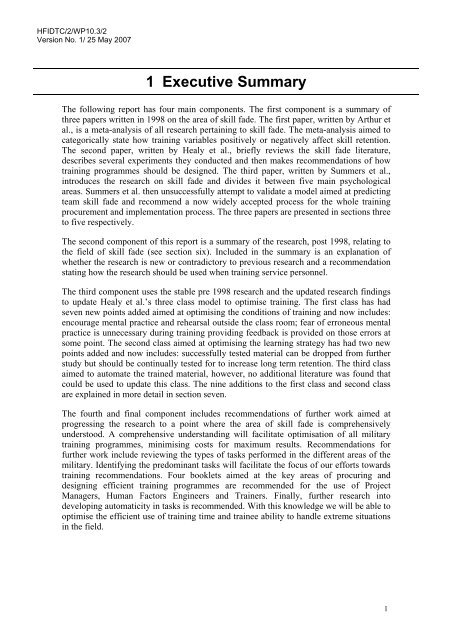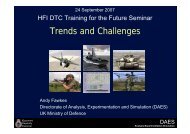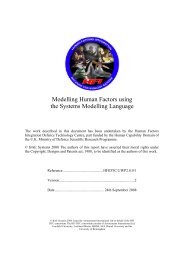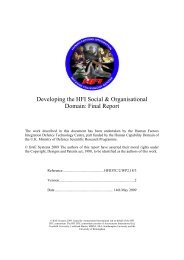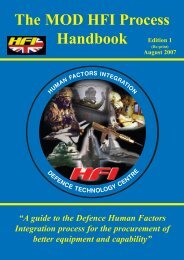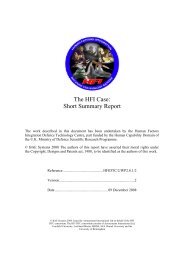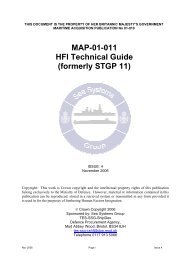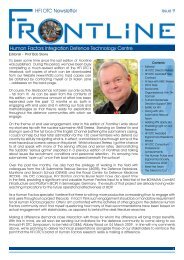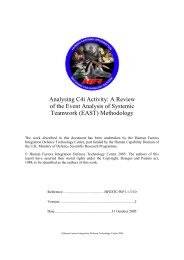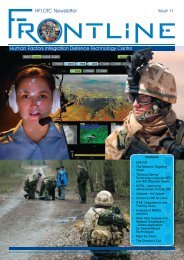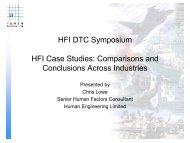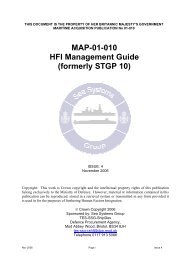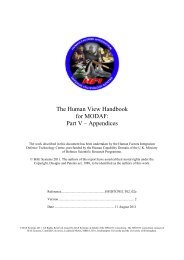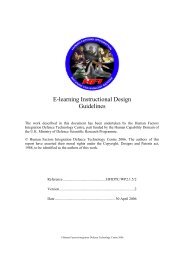Literature Review on Skill Fade - Human Factors Integration ...
Literature Review on Skill Fade - Human Factors Integration ...
Literature Review on Skill Fade - Human Factors Integration ...
Create successful ePaper yourself
Turn your PDF publications into a flip-book with our unique Google optimized e-Paper software.
HFIDTC/2/WP10.3/2<br />
Versi<strong>on</strong> No. 1/ 25 May 2007<br />
1 Executive Summary<br />
The following report has four main comp<strong>on</strong>ents. The first comp<strong>on</strong>ent is a summary of<br />
three papers written in 1998 <strong>on</strong> the area of skill fade. The first paper, written by Arthur et<br />
al., is a meta-analysis of all research pertaining to skill fade. The meta-analysis aimed to<br />
categorically state how training variables positively or negatively affect skill retenti<strong>on</strong>.<br />
The sec<strong>on</strong>d paper, written by Healy et al., briefly reviews the skill fade literature,<br />
describes several experiments they c<strong>on</strong>ducted and then makes recommendati<strong>on</strong>s of how<br />
training programmes should be designed. The third paper, written by Summers et al.,<br />
introduces the research <strong>on</strong> skill fade and divides it between five main psychological<br />
areas. Summers et al. then unsuccessfully attempt to validate a model aimed at predicting<br />
team skill fade and recommend a now widely accepted process for the whole training<br />
procurement and implementati<strong>on</strong> process. The three papers are presented in secti<strong>on</strong>s three<br />
to five respectively.<br />
The sec<strong>on</strong>d comp<strong>on</strong>ent of this report is a summary of the research, post 1998, relating to<br />
the field of skill fade (see secti<strong>on</strong> six). Included in the summary is an explanati<strong>on</strong> of<br />
whether the research is new or c<strong>on</strong>tradictory to previous research and a recommendati<strong>on</strong><br />
stating how the research should be used when training service pers<strong>on</strong>nel.<br />
The third comp<strong>on</strong>ent uses the stable pre 1998 research and the updated research findings<br />
to update Healy et al.’s three class model to optimise training. The first class has had<br />
seven new points added aimed at optimising the c<strong>on</strong>diti<strong>on</strong>s of training and now includes:<br />
encourage mental practice and rehearsal outside the class room; fear of err<strong>on</strong>eous mental<br />
practice is unnecessary during training providing feedback is provided <strong>on</strong> those errors at<br />
some point. The sec<strong>on</strong>d class aimed at optimising the learning strategy has had two new<br />
points added and now includes: successfully tested material can be dropped from further<br />
study but should be c<strong>on</strong>tinually tested for to increase l<strong>on</strong>g term retenti<strong>on</strong>. The third class<br />
aimed to automate the trained material, however, no additi<strong>on</strong>al literature was found that<br />
could be used to update this class. The nine additi<strong>on</strong>s to the first class and sec<strong>on</strong>d class<br />
are explained in more detail in secti<strong>on</strong> seven.<br />
The fourth and final comp<strong>on</strong>ent includes recommendati<strong>on</strong>s of further work aimed at<br />
progressing the research to a point where the area of skill fade is comprehensively<br />
understood. A comprehensive understanding will facilitate optimisati<strong>on</strong> of all military<br />
training programmes, minimising costs for maximum results. Recommendati<strong>on</strong>s for<br />
further work include reviewing the types of tasks performed in the different areas of the<br />
military. Identifying the predominant tasks will facilitate the focus of our efforts towards<br />
training recommendati<strong>on</strong>s. Four booklets aimed at the key areas of procuring and<br />
designing efficient training programmes are recommended for the use of Project<br />
Managers, <strong>Human</strong> <strong>Factors</strong> Engineers and Trainers. Finally, further research into<br />
developing automaticity in tasks is recommended. With this knowledge we will be able to<br />
optimise the efficient use of training time and trainee ability to handle extreme situati<strong>on</strong>s<br />
in the field.<br />
1


